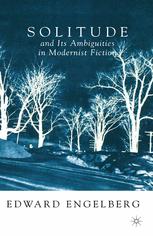

Most ebook files are in PDF format, so you can easily read them using various software such as Foxit Reader or directly on the Google Chrome browser.
Some ebook files are released by publishers in other formats such as .awz, .mobi, .epub, .fb2, etc. You may need to install specific software to read these formats on mobile/PC, such as Calibre.
Please read the tutorial at this link: https://ebookbell.com/faq
We offer FREE conversion to the popular formats you request; however, this may take some time. Therefore, right after payment, please email us, and we will try to provide the service as quickly as possible.
For some exceptional file formats or broken links (if any), please refrain from opening any disputes. Instead, email us first, and we will try to assist within a maximum of 6 hours.
EbookBell Team

4.3
28 reviewsIn this study of solitude in high modernist writing, Edward Engelberg explores the ways in which solitude functions thematically to shape meaning in literary works, as well as what solitude as a condition has contributed to the making of a trope. Selected novels are analyzed for the ambiguities that solitude injects into their meanings. The freedom of solitude also becomes a burden from which the protagonists seek liberation. Although such ambiguities about solitude exist from the Bible and the Ancients through the centuries following, they change within the context of time. The story of solitude in the twentieth century moves from the self's removal from society and retreat into nature to an extra-social position within which the self confronts itself. A chapter is devoted to the synoptic analysis of solitude in the West, with emphasis on the Renaissance to the twentieth century, and another chapter analyzes the ambiguities that set the stage for modernism: Defoe's Robinson Crusoe. Selected works by Woolf, Mann, Camus, Sartre, and Beckett highlight particular modernist issues of solitude and how their authors sought to resolve them.